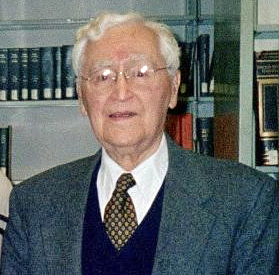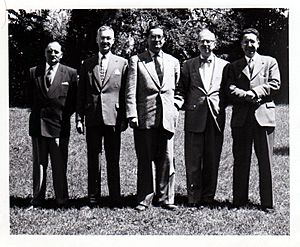Bruce M. Metzger facts for kids
Quick facts for kids
Bruce M. Metzger
|
|
|---|---|
 |
|
| Born |
Bruce Manning Metzger
February 9, 1914 |
| Died | February 13, 2007 (aged 93) Princeton, New Jersey, US
|
| Alma mater |
|
| Era | 20th century |
|
Notable work
|
|
| Spouse(s) |
Isobel Metzger
(m. 1944) |
| Scientific career | |
| Institutions | Princeton Theological Seminary |
| Thesis | Studies in a Greek Gospel Lectionary (Greg. 303) (1942) |
| Notable students | Greg Boyd, Bart D. Ehrman, Michael J. Gorman, |
Bruce Manning Metzger (born February 9, 1914 – died February 13, 2007) was an American expert on the Bible. He was a biblical scholar, meaning he studied the Bible deeply. He was also a Bible translator, helping to create new versions of the Bible, and a textual critic, someone who studies old texts to find the most accurate original words.
Metzger taught for a long time at Princeton Theological Seminary. He was also a Bible editor for groups like the American Bible Society. He was very skilled in Greek and the New Testament (the second part of the Christian Bible). He wrote many books and articles about these topics. Many people consider him one of the most important New Testament scholars of the 20th century.
Bruce Metzger's Life Story
Bruce Metzger was born in Middletown, Pennsylvania, on February 9, 1914. He went to Lebanon Valley College and earned his first degree in 1935. He was very good at Greek even before he started at Princeton Theological Seminary. He had already read the entire Bible twelve times!
In 1938, he earned his theology degree from Princeton Seminary. Soon after, he started teaching there as a teaching fellow, focusing on New Testament Greek. In 1939, he became a minister in the Presbyterian Church. He continued his studies at Princeton University, earning his Master of Arts degree in 1940 and his PhD in 1942. His PhD research was about an old Greek Gospel book.
In 1944, Bruce Metzger married Isobel Elizabeth Mackay. Her father was the president of Princeton Seminary. That same year, Metzger became an Assistant Professor. He became an Associate Professor in 1948 and a full Professor in 1954. In 1964, he was given a special title: the George L. Collord Professor of New Testament Language and Literature.
Metzger was recognized by many important academic groups. He was elected to the Catholic Biblical Association in 1969. In 1971, he became president of two major Bible study societies: the Studiorum Novi Testamenti Societas and the Society of Biblical Literature. He also visited famous universities like Clare Hall, Cambridge and Wolfson College, Oxford.
In 1978, he became a corresponding fellow of the British Academy, which is a very high honor for scholars outside the United Kingdom. In 1986, he joined the American Philosophical Society. After teaching for 46 years at Princeton Theological Seminary, he retired at age 70. In 1994, he received the Burkitt Medal for Biblical Studies from the British Academy. He also received special honorary degrees from several universities around the world.
Many scholars respected Metzger for his deep knowledge of ancient and modern languages, his fair judgment, and his careful attention to detail.
Bruce Metzger passed away in Princeton, New Jersey, on February 13, 2007, shortly after his 93rd birthday. His wife, Isobel, and their two sons, John and James, survived him.
His Work on the Bible
Bruce Metzger worked on and wrote about many Bible translations. He was a key editor for the United Bible Societies' Greek New Testament, which is used as a base for almost all modern New Testament translations.
In 1952, he started working on the Revised Standard Version (RSV) of the Bible. He was also the main editor for the Reader's Digest Bible in 1982, which was a shorter version of the RSV. From 1977 to 1990, he led the team that created the New Revised Standard Version (NRSV) of the Bible. He played a big part in getting this version published. He even had the chance to present the NRSV to Pope John Paul II and the leader of the Eastern Orthodox Church, Patriarch Demetrius I. The NRSV includes books that Protestants call the Apocrypha, but Roman Catholics and Eastern Orthodox Christians consider them deuterocanonical (meaning they are part of their official Bible).
Metzger wrote a very important set of three books about the New Testament:
- The Text of the New Testament: Its Transmission, Corruption, and Restoration (first published in 1964)
- The Early Versions of the New Testament: Their Origin, Transmission, and Limitations (1977)
- The Canon of the New Testament: Its Origin, Development, and Significance (1987)
These books helped people understand how the New Testament was passed down through history, how it was translated into different languages, and how the books of the New Testament were chosen to be part of the Bible.
Metzger's studies often used methods like historical criticism, which looks at the historical background and how the Bible was written. He explained that the early church had specific rules for deciding which books should be in the New Testament. These rules were:
- Orthodoxy: The book had to agree with the main beliefs of the Christian faith.
- Apostolicity: The book had to be written by an Apostle (one of Jesus's closest followers) or someone who knew an Apostle well.
- Consensus: The book had to be accepted and used by most churches.
Metzger believed that the church didn't just "create" the Bible's list of books. Instead, they recognized that certain writings already had a special, authoritative quality that made them belong in the Bible.
See also
 In Spanish: Bruce M. Metzger para niños
In Spanish: Bruce M. Metzger para niños
 | Ernest Everett Just |
 | Mary Jackson |
 | Emmett Chappelle |
 | Marie Maynard Daly |


